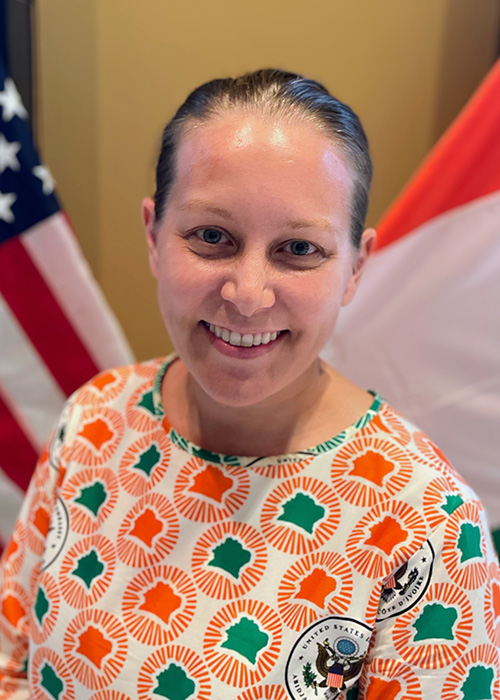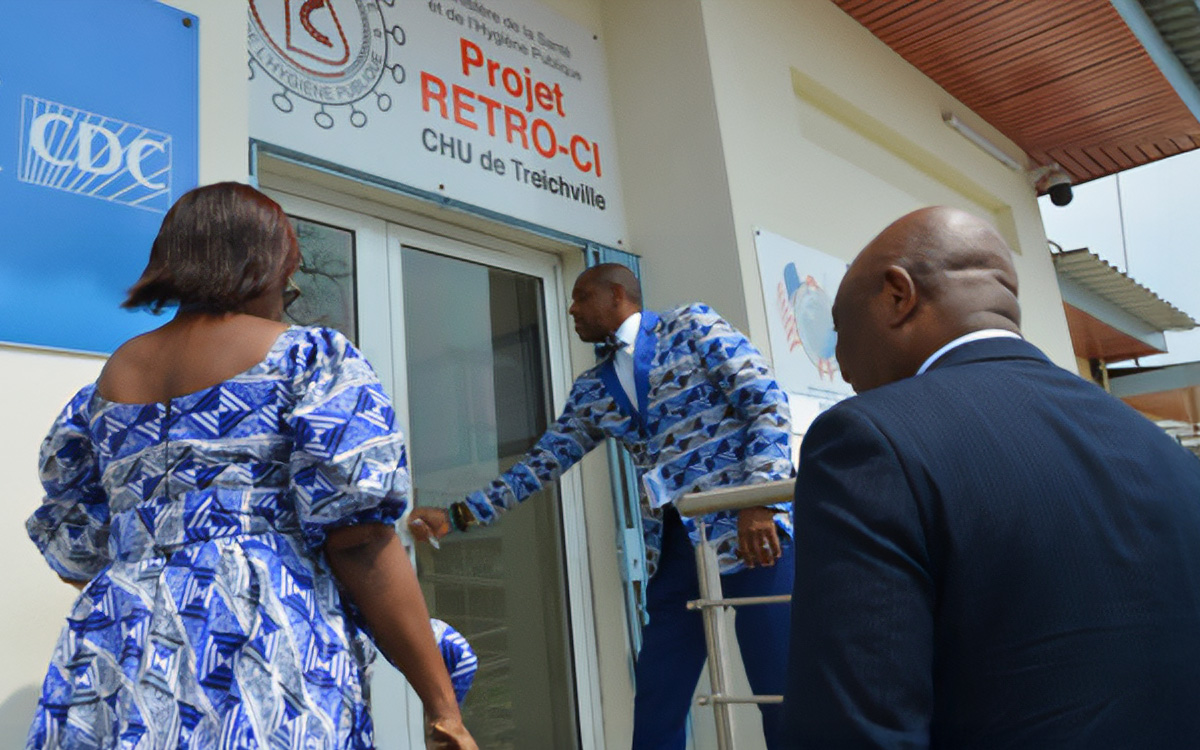From Atlanta to Côte D'Ivoire: How the CDC Protects Americans Overseas
A Q&A with Audrey Knutson Luxenberg, CDC Côte d’Ivoire’s strategic information branch chief.

Audrey Knutson Luxenberg is a public health adviser with the Centers for Disease Control and Prevention (CDC), serving since October 2020 as the strategic information branch chief in the Division of Global HIV and TB for CDC Côte d’Ivoire at U.S. Embassy Abidjan. She was a Peace Corps volunteer in Morocco from 2009 to 2011.
Everyone knows AFSA’s six member agencies—State, USAID, FAS, FCS, APHIS, and USAGM—do much of their critical work at our embassies abroad. But not everyone knows that the Centers for Disease Control and Prevention (CDC) has staff posted in 60 countries overseas working to safeguard Americans back at home. The Journal asked Audrey Knutson Luxenberg, a CDC expert currently assigned to Côte d’Ivoire, to tell us about the work she and her colleagues are doing to promote health and safety back home.
Luxenberg is a public health adviser with the CDC, serving since October 2020 as the strategic information branch chief in the Division of Global HIV and TB for Côte d’Ivoire at U.S. Embassy Abidjan. Prior to joining CDC, Luxenberg worked as a program analyst at Peace Corps headquarters and served as a youth development volunteer with the Peace Corps in Morocco from 2009 to 2011. She would like to thank Erin Sauber-Schatz and Laura Emmanuel of the CDC’s Global Health program for their input as she worked to answer the questions below. Her answers have been lightly edited.
Foreign Service Journal: What is the role of typical CDC personnel at an embassy?
Audrey Knutson Luxenberg: CDC is the lead U.S. government agency dedicated to the health and safety of the American people and the lead technical global public health agency for the U.S. CDC works 24/7 worldwide to reduce morbidity and mortality and safeguard communities by addressing global health hazards that could threaten the United States and our interests.
The goal of CDC’s global health work is to improve health outcomes and strengthen global health security by building the capacity of partner countries to detect diseases and stop health hazards. The earlier a disease threat is known, the sooner our response can begin to prevent spread to the United States and other countries.
CDC employs leadership, technical, and subject matter experts who serve in our overseas offices. These offices are led by country or regional directors dedicated to CDC’s global mission: to protect people in the United States and around the world by preventing, detecting, and responding to disease threats—anytime and anywhere.
CDC’s overseas offices implement our mission by:
• stopping health threats at their source before they spread to the United States and other countries;
• containing disruptive global disease outbreaks;
• using global data for disease prevention and mitigation programs in the United States and other countries; and
• saving lives and improving health globally.
Thanks to our extensive global presence and decades-long, government-to-government partnerships, CDC’s global staff often receive the first call from host country governments and learn about outbreaks before anyone else. The Global Health Center (GHC)’s deep and long-term commitment to global health impact has saved millions of lives.
CDC’s global staff often receive the first call from host country governments and learn about outbreaks before anyone else.
FSJ: Are CDC staff located at every U.S. embassy?
AKL: CDC has a network of country and regional offices in more than 60 countries. The number of CDC assignees per team varies by location. In addition to our bilateral country offices, since 2020, CDC has established six regional offices, covering Eastern Europe/Central Asia, the Middle East/North Africa, South America, Southeast Asia, Central America and the Caribbean, and East Asia/Pacific.
The two largest programs represented in our overseas offices involve global HIV/TB and global health security, but our country offices also include staff engaged in work focused on malaria, vaccine-preventable diseases, and more. CDC’s global offices engage regularly with subject matter experts from CDC headquarters and coordinate closely with host governments and in-country partners to address health threats.
FSJ: What are the goals of the CDC at your post?
AKL: Our global health security goal is to be America’s first line of defense against health threats that begin overseas and could potentially impact the United States. By preventing and containing outbreaks where they start, CDC makes Americans safer, reducing the risk of deadly diseases like measles, influenza, Ebola, TB, drug-resistant HIV, and other emerging threats from spreading into the U.S. We work toward this goal by improving our Ivoirian partners’ capacity to more quickly respond to health emergencies.
The goal of CDC Côte d’Ivoire’s HIV & TB program is to support Côte d’Ivoire in achieving an HIV-free generation and in preventing the spread of TB among people living with HIV. We are working toward achieving 95-95-95 targets by 2030—this aims to ensure that 95 percent of people living with HIV know their status, that 95 percent of people who know their status are on life-saving HIV treatment, and that 95 percent of people on treatment have a suppressed viral load. Maintaining viral suppression of HIV extends the lives of people living with HIV and prevents transmission to others, enabling HIV epidemic control.
We work closely with our Ivoirian counterparts through cooperative agreements with the Ministry of Health and other government partners, as well as with local and international organizations working in Côte d’Ivoire. The U.S. President’s Emergency Plan for AIDS Relief (PEPFAR) supports life-saving HIV treatment for more than 300,000 Ivoirians at more than 500 clinics throughout Côte d’Ivoire.

In November 2023, then State Department U.S. Global AIDS Coordinator and Senior Bureau Official for Global Health Security and Diplomacy Dr. John Nkengasong checks in on the CDC research station for Retrovirus Côte d’Ivoire (Retro-CI) in Abidjan, established in 1988 to address the HIV epidemic.
CDC
FSJ: Any recent CDC victories at your post to share?
AKL: Côte d’Ivoire is making great progress toward the 95-95-95 targets. When I started supporting this CDC country office in 2018, Côte d’Ivoire was at 73-78-77, meaning that 73 percent of people living with HIV knew their status, 78 percent of those who knew their status were receiving HIV treatment, and 77 percent of people receiving treatment had reached viral suppression. These percentages have since increased to 82, 88, and 88 percent, respectively, as of 2023 estimates. The percentage of people aged 15 to 49 years who live with HIV in Côte d’Ivoire was at its highest at 7.4 percent in 1995 and has since dropped to 1.8 percent as of 2023 estimates, in large part because of PEPFAR’s work to prevent and treat HIV.
CDC is supporting the Ministry of Health to conduct a national population-based HIV impact assessment (PHIA) in collaboration with the National Agency of Statistics and other partners. The survey is assessing key indicators such as HIV incidence, prevalence, viral load suppression, and risk behaviors.
My understanding from talking to Ivoirian colleagues is that HIV really felt like an ominous threat in the 1990s. According to a survey conducted seven years ago, only about 40 percent of adults living with HIV were virally suppressed. While we still have a long way to go, HIV is much more of a manageable issue now, and we expect that the most recent PHIA results will show improvement in these metrics. We will continue to use the survey results to guide Côte d’Ivoire in determining where remaining gaps can be addressed.
CDC also supported Côte d’Ivoire to conduct its first-ever “7-1-7 evaluation” to improve early and effective action to contain infectious disease outbreaks. The abbreviation, 7-1-7, stands for the goal of taking no more than seven days to detect a suspected infectious disease outbreak, one day to notify public health authorities to start an investigation, and seven days to complete an initial response. The evaluation measures how well the detection and response system is working and helps countries determine what is working well and what needs to be improved.
In total, 58 human, animal, and environmental outbreaks occurring from 2021 to 2024 were included in the evaluation. In September 2024, bottlenecks and enablers for the 58 outbreaks were presented to the deputy director of health, representing the Ministry of Health, the National Institute of Public Hygiene executive board and staff; Regional Emergency Operations Center members; technical, financial, and implementing partners; and various partners from the human, animal, and environmental health sectors. Seeing the value of 7-1-7 for rapid performance improvement, Côte d’Ivoire has committed to beginning to use 7-1-7 for future outbreaks to continue to improve their global health security capacities.
An estimated 7.8 million babies have been born HIV-free thanks to this uniquely American act of generosity.
FSJ: What do you wish Americans (ordinary Americans as well as FS members) knew about your work on behalf of the U.S. government overseas?
AKL: My experiences and conversations with Ivoirians highlight that the United States is a trusted partner. PEPFAR supports HIV testing and treatment that reaches farmers and laborers in Côte d’Ivoire who produce cocoa, cashews, coffee, and other products that Americans consume daily and that benefit our bilateral commerce.
Most Americans probably don’t think about it now, but they have benefited from the continuous hard work to prevent and treat HIV—making HIV much less of a global issue than it was 20 years ago. In fact, PEPFAR has saved more than 26 million lives globally since its founding. An estimated 7.8 million babies have been born HIV-free thanks to this uniquely American act of generosity.
Even as cuts to global health funding make the news back home, our work in Côte d’Ivoire continues, making Americans safer by responding to emerging and infectious diseases around the world to stop their spread, before they reach American shores.
When sharing or linking to FSJ articles online, which we welcome and encourage, please be sure to cite the magazine (The Foreign Service Journal) and the month and year of publication. Please check the permissions page for further details.
Read More...
- “Combating Threats of Emerging Diseases” by Dr. Charles W. Oliver and Dr. Jaime Chang Neyra, The Foreign Service Journal, September 2002
- “HHS and Health Diplomacy” by Jimmy Kolker, The Foreign Service Journal, May 2017
- “Waking Up to a Pandemic: H1N1 in Mexico, 2009” by Leslie Bassett, The Foreign Service Journal, July-August 2020



